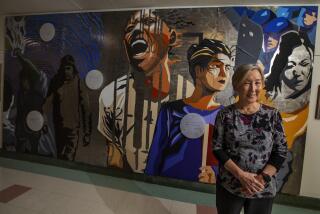Getting a Head Start : Grant Propels UCI Team Into Neurology Research Arena
- Share via
IRVINE — UC Irvine’s burgeoning neuroscience programs have received another boost: a $1-million grant to fund joint research in neurobiology among scientists of different disciplines, officials said Monday.
Scientists see the grant from the Lucille P. Markey Charitable Trust as a seed to start a grand initiative: the gathering of 14 of UCI’s most illustrious minds and young academic talent to explore new ways to diagnose and treat diseases of the nervous system. Eventually, they envision a “brain trust” of about 50 scientists working to penetrate the mysteries of what really goes on--and what goes wrong--inside peoples’ heads.
The group intends to target neurology-related maladies such as Parkinson’s disease, Alzheimer’s disease, depressive disorders and schizophrenia, combining research with clinical treatment.
Neuroscience has become one of the stars of UCI’s research universe and a point of pride for Chancellor Laurel L. Wilkening, who said in September that UCI’s goal is to be ranked among the nation’s top 50 research institutions by the year 2000.
Carl Cotman, co-director of the new UCI-Markey Program Initiative in Human Neurobiology, said the grant will help neurosciences at UCI get recognized nationwide. Big-name universities such as the Massachusetts Institute of Technology have scored the same grant in the past.
“It’s not the biggest grant, but it’s one of the most strategic,” Cotman said of the gift from the Markey trust, which targets basic medical research.
The grant has encouraged UCI to continue its efforts at bringing together experts from unrelated disciplines so they can brainstorm ground-breaking ways to solve problems.
Take a peek at a few of the noted members of the new UCI team: John Wasmuth, director of UCI’s participation in the nationwide Human Genome Project; Edward G. Jones, an anatomist and neurobiologist involved in mapping the human brain; William H. Batchelder, a cognitive scientist trying to use mathematics to model the way human beings think, and Ron Frostig, a psychobiologist who studies the brain as it’s functioning.
In the future, most of them are likely to work out of a neurosciences building that will be the first structure in the university’s mega-million-dollar planned research complex called the Center for the Health Sciences. UCI still needs to raise from $3 million to $5 million of the $22-million to $24-million price tag on the neurosciences building, but they expect to break ground June 1.
*
Cotman, one of UCI’s top grant-getters, is known for his work in brain aging and Alzheimer’s disease. He believes UCI’s neurosciences programs may come up with innovative ways to treat people suffering from nervous system problems at the campus’ Alzheimer’s clinic, Bonney Center for Neurobiology of Thinking and Memory, and other clinical sites around the county.
“There’s nothing more frustrating than retiring, and having made it in life, and you find out you can’t remember things,” Cotman said of the disease. “Just when you’ve got time to relax, and it hits you.”
W. Ian Lipkin, co-director of the nascent program, said the neurology project is unusual because it unites clinicians with basic scientists, and throws in computer and imaging experts as well. The combination makes UCI “one of the hottest places” nationwide in neurosciences, he said.
“What you’ll see because of this is that basic scientists are going to be changing the direction of their research programs, and clinicians will bring ideas to basic scientists about problems they see that need to be addressed,” Lipkin said.
He said he looks forward to working with the “cast of characters” that make up the first phase of the neuroscience team, and hopes early successes can help attract more grants from private and federal sources.






